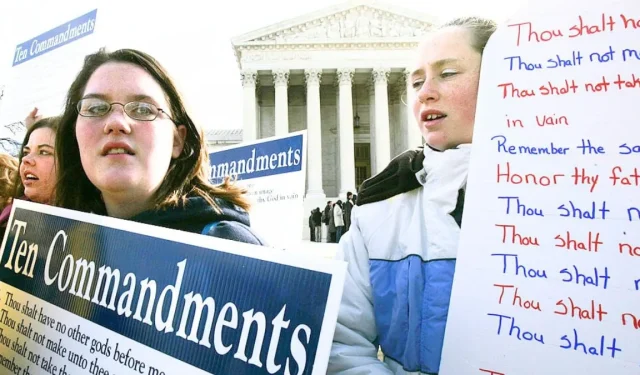
A Legal Win for Separation of Church and State in Louisiana
A significant ruling was recently handed down by a federal court, providing a crucial barrier against the encroachment of religious conservatism on public education. This decision represents a pivotal moment in the ongoing struggle to maintain the separation of church and state in the United States.
Court Ruling Blocks Ten Commandments Display in State Schools
In Louisiana, Judge John W. DeGravelle issued a ruling that prevents the implementation of a law mandating the display of the Ten Commandments in all public school classrooms. This law, which was set to take effect next year, has been deemed unconstitutional, reinforcing the importance of adhering to the First Amendment.
Details of the Ruling
Judge DeGravelle emphasized that the law violated the First Amendment, which prohibits any legislation that favors the establishment of religion. In his assessment, he condemned the law as “unconstitutional on its face,” determining that requiring the Ten Commandments in schools would subject students to religious doctrine throughout their school day. The judge argued that this effectively turns students into a “captive audience” to religious teachings, which is inappropriate in public education.
ACLU’s Role in Legal Challenge
Passed earlier this year, the controversial law would have made Louisiana the first state to enforce such a requirement for classroom displays. The American Civil Liberties Union (ACLU) quickly objected to the legislation and filed a lawsuit on behalf of five local school boards. Heather L. Weaver, a Senior Staff Attorney at ACLU’s Program on Freedom of Religion and Belief, stated, “This ruling should serve as a reality check for Louisiana lawmakers who want to use public schools to convert children to their preferred brand of Christianity.” She firmly asserted, “Public schools are not Sunday schools.”
Political Implications of the Ruling
The decision to block the law has sparked a reaction from Louisiana Attorney General Elizabeth Murrill, who voiced concerns about a “chilling effect”that could arise, deterring other school boards from enforcing similar displays. Murrill suggested that the ruling may create uncertainty among the remaining 67 school boards impacted by the legislation.
A Broader Trend
While this ruling stands as a victory for advocates of religious freedom, it is part of a larger national trend wherein religious conservatives are pursuing legislation aimed at integrating Christian doctrine into public education. In 2024 alone, there have been 91 proposed bills across 29 states that seek to promote religious teachings in schools, echoing similar attempts in states like Oklahoma and Utah to enforce the display of the Ten Commandments.
Conclusion: Upholding Religious Freedom in Schools
The push for laws that intertwine public education with a conservative Christian agenda raises important questions about the direction of American values. As calls to impose religious doctrines on children in public schools intensify, it is essential to uphold principles of religious freedom for all citizens. The core ideals upheld by the founding fathers—liberty and freedom from the establishment of religion—must remain protected from any attempts to transform the United States into a theocracy.
This recent legal victory underscores the need for ongoing vigilance against efforts that threaten to dilute the separation of church and state. It is imperative to advocate for a diverse educational framework that respects all beliefs while safeguarding the ideals of secularism.




Leave a Reply